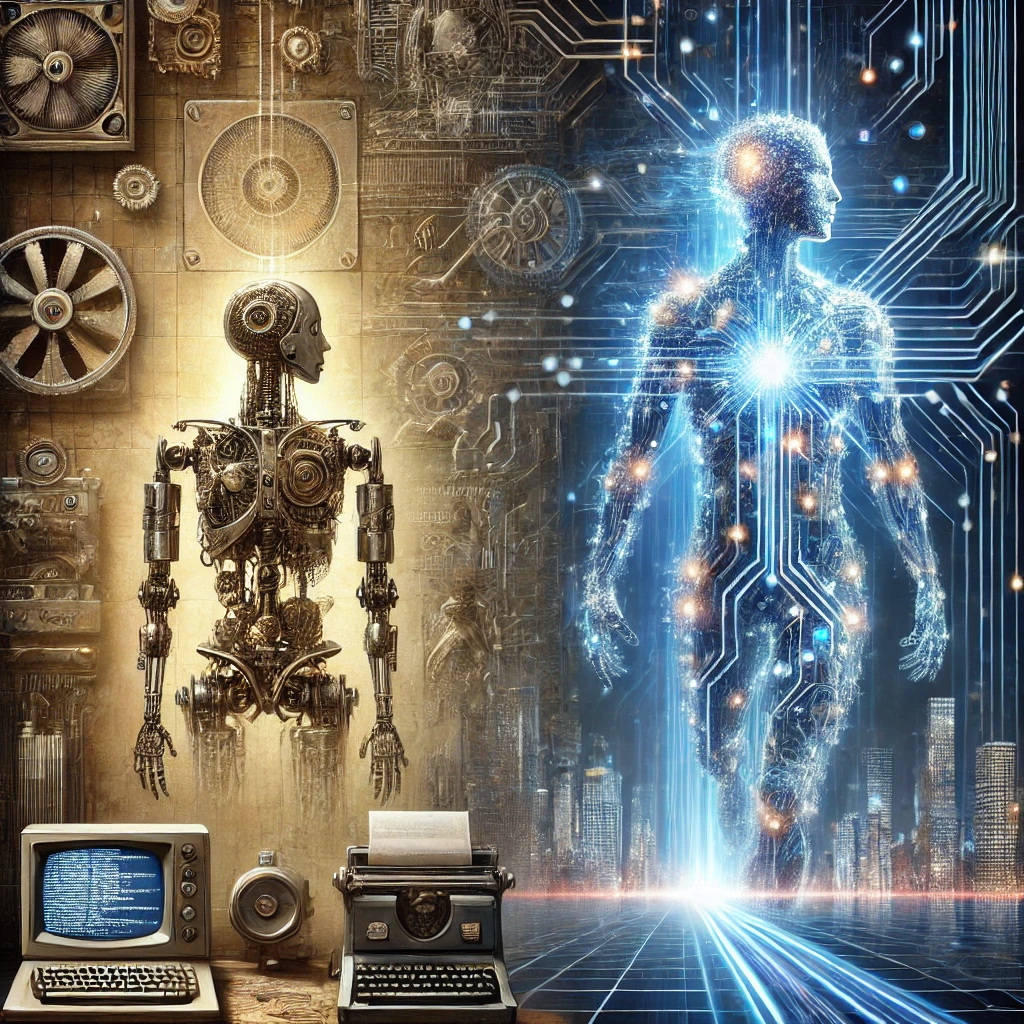Inteligjenca artificiale (AI) ka kaluar nga një koncept ambicioz në një forcë transformuese që po ndryshon industri dhe jetën e njeriut. Nga asistenti virtual si Siri dhe Alexa, te diagnostikimi i sëmundjeve dhe parashikimi i tendencave klimatike, AI ka depërtuar në çdo aspekt të ekzistencës sonë. Por si filloi kjo udhëtim fascinues? Dhe ku po shkon? Le të hedhim një vështrim mbi origjinën, zhvillimin dhe të ardhmen e AI për të kuptuar ndikimin e saj te njerëzimi.
Fillimet e AI
Ideja për të krijuar makina që mund të mendojnë dhe mësojnë si njerëzit ka intriguar njerëzimin për shekuj me radhë, duke u përmendur në mite dhe në letërsi shkencore të hershme. Megjithatë, nuk ishte deri në mes të shekullit të 20-të që AI filloi të marrë formë si një disiplinë shkencore.
Në vitin 1950, Alan Turing, matematikant dhe kriptograf, propozoi një pyetje revolucionare në artikullin e tij “Computing Machinery and Intelligence” — “A mund të mendojnë makinat?” Ai prezantoi konceptin e Testit të Turingut, një metodë për të vlerësuar aftësinë e një makine për të treguar inteligjencë të ngjashme me atë të njeriut.
Lindja zyrtare e AI si fushë ndodhi në vitin 1956 gjatë Konferencës Dartmouth, ku vizionarë si John McCarthy, Marvin Minsky dhe të tjerë u mblodhën për të eksploruar idenë e krijimit të makinave inteligjente. McCarthy shfrytëzoi termin “inteligjencë artificiale,” duke shënuar fillimin e një udhëtimi ambicioz.
Pikët Kryesore në Zhvillimin e AI
Vitet e hershme të kërkimit në AI karakterizoheshin nga entuziazmi dhe qëllime ambicioze. Programet si Logic Theorist (1955) demonstruan aftësinë e makinave për të zgjidhur probleme matematike, dhe ELIZA (1964) simuloi biseda njerëzore, edhe pse në mënyrë të kufizuar.
Megjithatë, përparimi ngadalësoi gjatë dimrit të AI në vitet 1970 dhe 1980 për shkak të mungesës së fuqisë kompjuterike, të dhënave të pamjaftueshme dhe pritshmërive të paplotësuara. Financimi u ndërpre dhe shumë studiues kaluan fokusin tek fusha të tjera.
Rilindja erdhi në vitet 1990, e nxitur nga avancimet në harduerin kompjuterik dhe zhvillimi i mësimit makinerik. Rrjetet nervore, të inspiruara nga truri njerëzor, filluan të tregojnë premtim në detyra si njohja e zërit dhe imazhit. AI filloi të kontribuojë praktikisht, nga shërbimi automatik ndaj klientit deri te sistemet e hershme të rekomandimeve.
AI në Shekullin 21
Shpërthimi i të dhënave të mëdha dhe zhvillimi i GPU-ve të fuqishme në vitet 2000 e çuan AI në rrjedhën kryesore. Algoritmet e mësimit makinerik mund të përpunonin tani sasi të mëdha të dhënash, duke mundësuar përparime në përpunimin e gjuhës natyrore, vizionin kompjuterik dhe robotikën.
Arritjet historike si fitorja e IBM Watson në Jeopardy! në 2011, fitorja e Google DeepMind AlphaGo kundër kampionëve botërorë në lojën Go, dhe modelet GPT të OpenAI që revolucionarizuan kuptimin e gjuhës treguan potencialin e AI. Këto zhvillime zgjeruan aplikimet e AI në fusha si shëndetësia, financat, argëtimi dhe transporti.
E Ardhmja e AI
E ardhmja e AI mbart premtime të mëdha dhe sfida komplekse. Ndërsa AI vazhdon të rrisë kreativitetin dhe vendimmarrjen njerëzore, pritet të revolucionarizojë industri si arsimi, shkenca klimatike dhe mjekësia e personalizuar. Sistemët autonomë, nga makinat te dronet, mund të riformësojnë transportin dhe logjistikën.
Megjithatë, rritja e shpejtë e AI ngre shqetësime etike dhe shoqërore. A do të marr AI vendet e punës apo do të krijojë mundësi të reja? Si të sigurojmë drejtësi dhe të parandalojmë paragjykimet në sistemet AI? A mund të mbrojmë privatësinë dhe sigurinë në një epokë ku AI është gjithkund?
Fushat e reja si AI e shpjegueshme (explainable AI) synojnë të adresojnë këto sfida, duke siguruar që vendimet e AI të jenë transparente dhe të kuptueshme. Bashkëpunimi midis qeverive, studiuesve dhe sektorit privat është kyç për krijimin e rregulloreve dhe kornizave që udhëheqin përdorimin e përgjegjshëm të AI.
Nga rrënjët konceptuale në vitet 1950 deri në praninë e saj të përhapur sot, AI ka qenë në një udhëtim të jashtëzakonshëm. Ajo nuk është më vetëm një mjet; është një forcë që formëson drejtimin e njerëzimit. Ndërsa shfrytëzojmë potencialin e saj, duhet të njohim edhe përgjegjësinë tonë për ta udhëhequr zhvillimin e saj në mënyrë etike. AI ka fuqinë të zgjidhë disa nga sfidat më të mëdha të njerëzimit, por vetëm nëse e përdorim me mençuri.
Historia e AI është larg përfundimit — ajo sapo ka filluar.




